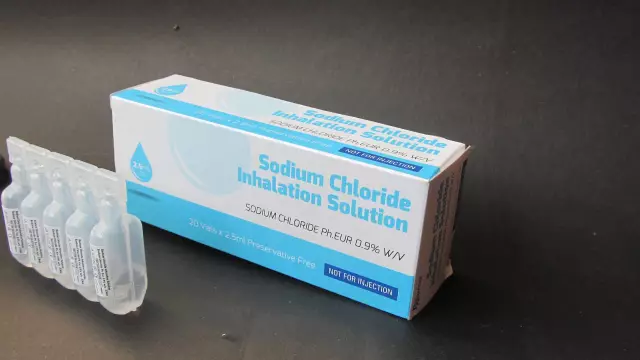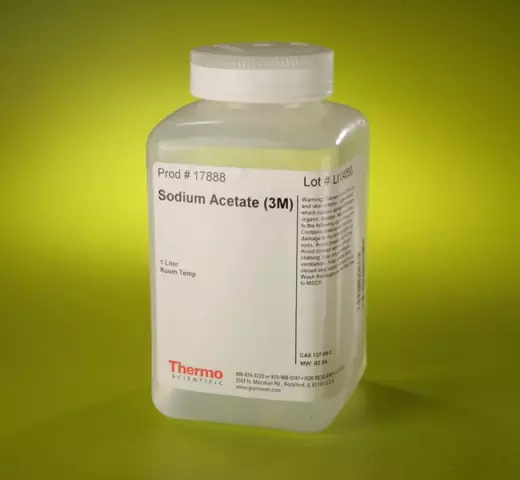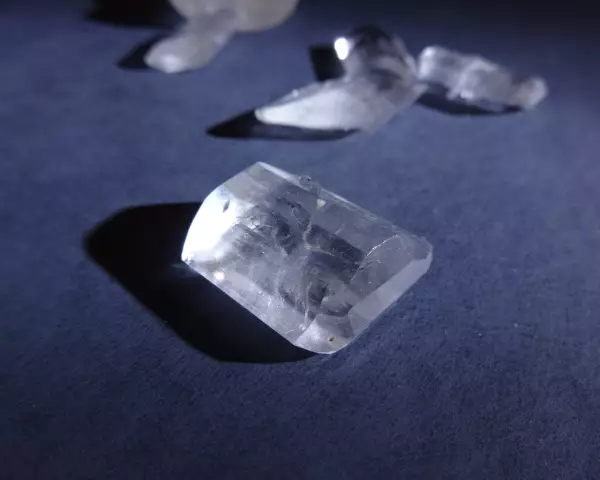- Author Rachel Wainwright wainwright@abchealthonline.com.
- Public 2023-12-15 07:39.
- Last modified 2025-11-02 20:14.
Levothyroxine sodium
Levothyroxine sodium: instructions for use and reviews
- 1. Release form and composition
- 2. Pharmacological properties
- 3. Indications for use
- 4. Contraindications
- 5. Method of application and dosage
- 6. Side effects
- 7. Overdose
- 8. Special instructions
- 9. Application during pregnancy and lactation
- 10. Use in the elderly
- 11. Drug interactions
- 12. Analogs
- 13. Terms and conditions of storage
- 14. Terms of dispensing from pharmacies
- 15. Reviews
- 16. The price of sodium in pharmacies
Latin name: Levothyroxine sodium
ATX code: H03AA01
Active ingredient: Levothyroxine sodium (Levothyroxine sodium)
Manufacturer: RUE Belmedpreparaty (Republic of Belarus)
Description and photo update: 2018-27-11

Levothyroxine sodium is a drug for the treatment of thyroid diseases.
Release form and composition
Dosage form - tablets: round, biconvex, white or white with a yellowish tinge (10 pcs. In blisters, 5 packs in a cardboard box and instructions for the use of Levothyroxine sodium).
Composition of 1 tablet:
- active substance: sodium levothyroxine - 0.05 mg or 0.1 mg;
- auxiliary components: lactose monohydrate, calcium stearate, potato starch, microcrystalline cellulose.
Pharmacological properties
Pharmacodynamics
Levothyroxine sodium is a drug that compensates for the deficiency of thyroid hormones. It is a synthetic levorotatory isomer of thyroxine.
The mechanisms of metabolic effects of the drug are explained by receptor binding to the genome, changes in oxidative metabolism in mitochondria, regulation of the flow of substrates and cations inside and outside the cell.
In small doses, the drug has an anabolic effect. In medium doses, it increases tissue oxygen demand, stimulates growth and development, as well as the metabolism of fats, carbohydrates and proteins, and increases the functional activity of the central nervous and cardiovascular systems. In high doses, it suppresses the production of thyroid-stimulating hormone of the pituitary gland and thyrotropin-releasing hormone of the hypothalamus.
In hypothyroidism, the clinical effect of Levothyroxine sodium appears in 3-5 days. Early diffuse hyperplastic goiter decreases or even disappears within 3-6 months. In the late nodal stages of the disease, a significant reduction in the size of the thyroid gland occurs in only 30% of patients, but almost all of them prevent its further increase.
Pharmacokinetics
After taking the drug inside, 80% of the dose is absorbed in the upper part of the small intestine. The degree of absorption decreases with simultaneous intake of food.
The maximum concentration in the blood is observed approximately 5-6 hours after taking the pill.
Levothyroxine sodium is characterized by a very high (more than 99%) bond with serum proteins: albumin, thyroxine-binding globulin and thyroxine-binding prealbumin. In different tissues of the body, the substance undergoes monodeiodination (approximately 80%), as a result of which triiodothyronine (T 3) and inactive products are formed. Thyroid hormones are metabolized primarily in the kidneys, liver, muscles, and brain. In small quantities, the drug undergoes decarboxylation and deamination with the formation of tetraiodothyroacetic acid, as well as conjugation in the liver with sulfuric and glucuronic acids.
Levothyroxine sodium is distributed mainly in the liver, muscles and brain. The volume of distribution is 0.5 l / kg.
About 15% is excreted in the bile and urine in unchanged form and in the form of metabolites. The half-life is 6-7 days, with hypothyroidism it increases to 9-10 days, with thyrotoxicosis it decreases to 3-4 days.
Indications for use
- hypothyroid states of various origins, including those caused by medication or surgical exposure;
- diffuse euthyroid (non-toxic) goiter, Hashimoto's autoimmune thyroiditis, multinodular goiter (as a means of suppressive thyroid therapy);
- hyperthyroidism [for thyrostatic treatment (including as part of combination therapy) after reaching the euthyroid state with the help of thyreostatic drugs];
- highly differentiated thyrotropin-dependent papillary / follicular carcinomas of the thyroid gland (as part of complex treatment);
- nodular goiter after resection of the thyroid gland (for the prevention of recurrence);
- scintigraphic test of thyroid suppression of the thyroid gland (as a diagnostic tool during its implementation).
Contraindications
- untreated hyperthyroidism;
- untreated adrenal cortex insufficiency (the drug can be used after its compensation);
- untreated hypopituitarism (hypothalamic-pituitary insufficiency);
- acute phase of myocarditis, acute carditis, acute myocardial infarction;
- the need for the simultaneous use of antithyroid drugs for hyperthyroidism in pregnant women;
- hypersensitivity to any component of Levothyroxine sodium.
The drug should be used with caution in the following cases:
- severe long-term hypofunction of the thyroid gland;
- arrhythmia;
- arterial hypertension;
- ischemic heart disease (angina pectoris, atherosclerosis, a history of myocardial infarction);
- malabsorption syndrome;
- pituitary insufficiency;
- diabetes mellitus and diabetes insipidus;
- elderly age.
Levothyroxine sodium, instructions for use: method and dosage
Levothyroxine sodium should be taken orally, in the morning on an empty stomach (20-30 minutes before meals), swallowing the tablets whole and drinking plenty of liquid.
The dose of the drug is set by the doctor individually, depending on the indication.
Approximate dosing regimens for hypothyroidism:
- adults: the initial dose is 0.025-0.1 mg per day, then the daily dose is gradually increased (by 0.025-0.05 mg every 2-3 weeks) to the optimal maintenance dose - 0.125-0.25 mg, after surgery for malignant tumors of the thyroid gland - up to 0.3 mg;
- children: the initial dose is 0.0125-0.05 mg per day, the maintenance daily dose for long-term treatment is determined at the rate of 0.1-0.15 mg / m 2.
With euthyroid goiter, as well as for the prevention of its recurrence after resection, adults are prescribed 0.075-0.2 mg per day, children - 0.0125-0.15 mg.
Side effects
- from the central nervous system: weakness, headache, dizziness, apathy, fatigue, lethargy, anxiety, nervousness, irritability, difficulty falling asleep, drowsiness; in children, pseudotumor of the brain is possible, manifested by severe headaches;
- on the part of the skin and subcutaneous tissue: allergic reactions (skin rashes, itching), hyperemia, dry skin, increased sweating, puffiness; in individual cases - angioedema;
- on the part of the cardiovascular system: drops in blood pressure, tachycardia, arrhythmia, ventricular hypertrophy;
- from the gastrointestinal tract: changes in appetite, diarrhea / constipation, nausea, vomiting;
- from the musculoskeletal system: tremors, muscle cramps of the lower extremities, myalgia, muscle weakness, chest pain; in women of menopausal age - a decrease in bone density;
- from the side of metabolism: an increase or decrease in body weight;
- others: fever, dysmenorrhea.
Overdose
In case of an overdose, a thyrotoxic crisis develops, sometimes several days after taking the drug.
As therapeutic measures, the use of beta-blockers, intravenous administration of corticosteroids, and plasmapheresis are indicated.
special instructions
Before prescribing Levothyroxine sodium, the presence of hypothalamic or pituitary hypothyroidism should be excluded.
In patients with concomitant cardiovascular diseases, Levothyroxine sodium should be used at the beginning of treatment in a low dose, it should be increased slowly and at long intervals.
With a prolonged course of hypothyroidism, a gradual increase in the dose of the drug is recommended.
Thyroid replacement therapy in patients with insufficient adrenal cortex function without adequate maintenance treatment with corticosteroids can lead to the development of an acute adrenal crisis.
Patients with diabetes mellitus during the diagnostic test of thyroid suppression are advised to increase the dose of the antidiabetic agent.
In some cases, thyroid hormone preparations can cause the development of myasthenic syndrome or aggravate the course of an existing disease.
During the period of therapy, it is recommended to control the level of thyroid-stimulating hormone. If its concentration is increased, then the dose of the drug is insufficient.
With a long-term multinodular goiter, a stimulation test with thyrotropin-releasing hormone must be performed before taking the drug.
Application during pregnancy and lactation
The use of levothyroxine sodium for hypothyroidism during pregnancy and lactation should be continued. During pregnancy, an increase in the dose of the drug may be required, due to a possible increase in the level of thyroxine-binding globulin (in the II and III trimesters, the dose is usually increased by 25%). However, it is contraindicated to simultaneously take thyreostatics, since Levothyroxine sodium reduces their concentration, which requires an increase in the dose.
The amount of the drug that passes into breast milk is not enough to cause any disturbance in the baby. However, treatment should be carried out with caution, under close medical supervision.
Use in the elderly
In old age, the dose of the drug should be increased gradually. The initial dose should not exceed 0.05 mg.
Drug interactions
- cholestyramine, calcium carbonate, aluminum hydroxide, sucralfate: the absorption of levothyroxine sodium from the gastrointestinal tract decreases and, as a result, its plasma concentration;
- indirect anticoagulants (coumarin derivatives): their action is potentiated;
- oral hypoglycemic agents, insulin: their effectiveness decreases (their dose may need to be increased at the beginning of the use of levothyroxine sodium);
- ritonavir, sertraline: the effect of levothyroxine sodium may decrease, which requires an increase in its dose;
- clofibrate, furosemide (at a dose of 250 mg), dicumarin, salicylates, tamoxifen, asparaginase, anabolic steroids: displacement of sodium levothyroxine from the connection with plasma proteins is possible;
- chloroquine: the metabolism of levothyroxine may increase;
- proguanil, chloroquine: an increase in the concentration of thyroid-stimulating hormone is possible;
- phenytoin (with rapid intravenous administration), phenobarbital: metabolic clearance is accelerated without changing the proportion of free T 3 and T 4 in the blood;
- estrogens: the concentration of the thyroglobulin-related fraction increases, which reduces the effectiveness of the drug;
- diazepam, beta-blockers, aminoglutethimide, amiodarone, carbamazepine, somatostatin, dopamine, levodopa, lovastatin, ethionamide, chloral hydrate, aminosalicylic acid, metoclopramide, antithyroid drugs: it is possible to change the levels of thyroid stimulating hormone and thyroid hormone distribution, which usually affects metabolism, action and / or excretion of thyroid hormones, or to change the secretion of thyroid-stimulating hormone.
Analogs
Levothyroxine sodium analogs are L-Tyroxin, L-Tyroxin 50 Berlin-Chemie, L-Tyroxin 75 Berlin-Chemie, L-Tyroxin 100 Berlin-Chemie, L-Tyroxin 125 Berlin-Chemie, L-Tyroxin 150 Berlin-Chemie, L- Thyroxine Acri, Bagotyrox, L-Tyrok, Tyro-4, Sodium levothyroxine, Eutirox, etc.
Terms and conditions of storage
Keep out of reach of children at room temperature.
Shelf life is 2 years.
Terms of dispensing from pharmacies
Dispensed by prescription.
Reviews about Levothyroxine sodium
Reviews of Levothyroxine sodium are controversial. In positive patients, the effectiveness of the drug in various diseases of the thyroid gland and its low cost are noted. Negative reports describe side effects that often led to the replacement of Levothyroxine sodium with a more expensive analogue. These include: drowsiness, fatigue, general malaise, nervousness, severe headaches.
Price for Levothyroxine sodium in pharmacies
The price of Levothyroxine sodium is currently unknown.
The cost of some popular analogues:
- L-Thyroxin (50 tablets per pack): 0.05 mg - 81-119 rubles, 0.1 mg - 120-172 rubles;
- L-Thyroxin Acri (100 tablets of 0.1 mg): 134-136 rubles;
- L-Tyroxin 50 Berlin-Chemie (50 tablets of 0.05 mg): 83-109 rubles;
- L-Tyroxin 100 Berlin-Chemie (50 tablets of 0.1 mg): 89-134 rubles.

Anna Kozlova Medical journalist About the author
Education: Rostov State Medical University, specialty "General Medicine".
Information about the drug is generalized, provided for informational purposes only and does not replace the official instructions. Self-medication is hazardous to health!






